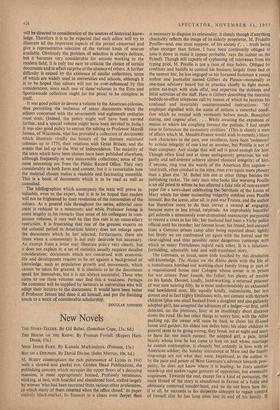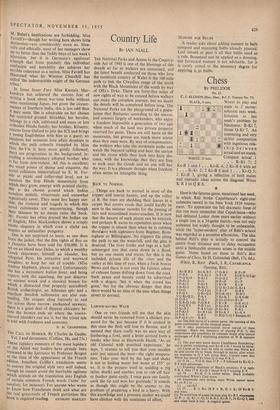New Novels
THE STORY-TELLER. By Gil Buhet. (Jonathan Cape, 13s. 6d.) M. BUHET contemplates the rich putrescence of Lyons in 1945 with a shrewd and gleeful eye. Golden Head Publications, the publishing concern which occupies the upper floors of a decaying mansion, is most appropriately housed. Profusely verminous, stinking, at best, with hoarded and abandoned food, staffed largely by women 'who had been 'recruited from various other professions, xo which many of them reverted when the office closed,' its paper entirely black-market, its finances in a chaos even deeper than
is necessary to disguise its criminality, it closely though if anything charitably reflects the image of its elderly proprietor, M. Fridolin Pouille—and, one must suppose, of his society ('. . . truth being often stranger than fiction, I have been continually obliged to tone it down to make it appear probable,' says the author on the flyleaf). Though still capable of syphoning off mistresses from his typing pool, M. Pouille is not a man of nice habits. Obliged by creditors and bailiffs to control his business largely from bed or the nearest bar, he has engaged as his harassed factotum a young author and journalist named Gilbert du Plessis—nominally as one-man advisory board but in practice chiefly to light stoves, prime rat-traps with stale offal, and supervise the dubious and fitful activities of the staff. Here is Gilbert describing the morning bedside-to-office telephone call by means of which he receives his confused and invariably countermanded instructions: 'My employer dignified with the name of asthma a catarrhal condi- tion which he treated with vermouth before meals, Beaujolais during, and cognac after. . . . While awaiting the expulsion of mucus to which his coughing formed the prelude, I had ample time to formulate the customary civilities.' (This is clearly a state of affairs which M. Mendes-France would wish to remedy.) Many such characters in the past, one recollects, have been 'redeemed' by artistic integrity of one kind or another, but Pouille is not of their company. Any sludge that will sell is good enough for him. Though often kind and• at times ambiguously generous, his vul- garity and self-interest achieve almost classical integrity; of him, if anyone, ring true the words of the American film caption— 'and truth, often crushed in the mire, rises ever again more phoney than a glass eye.' M. Buhet hits out at other things besides the publishing racket. The only man who looks like worsting Pouille is an old priest to whom he has effected a fake sale of non-existent paper for a news-sheet celebrating the Servitude of the Loves of Mary which for sheer nauseating vulgarity outdoes even Pouille himself. But the scene, after all, is post-war France, and the author has therefore more to do than survey a swamp of engaging, because more or less trivial, turpitude. An improbably beautiful girl submits a strenuously over-dramatised manuscript purporting to record a crisis in her life; her husband had been a Vichy police official until his murder; her former lover, his friend, had escaped from a German prison camp after being reported dead; lightly but firmly we are confronted yet again with the hatred and the clear-sighted and thus possibly more dangerous contempt with which so many Frenchmen regard each other. It is a hilarious, forbidding, admirably told and well-translated story.
l'he Germans, as Usual, seem little touched by this desolating self-knowledge. The House on the Rhine deals with the life of a tumultuous bombed-out working-class family living in part of a requisitioned house near Cologne whose owner is in prison for war crimes. Poor Joseph, the father, has plenty of trouble on his hands. Devout, kindly, hard-working, a returned prisoner of war now nearing fifty, he is most understandably an exhausted and bewildered man. His equally kindly, indomitable, but less devout and in fact highly libidinous wife, not content with thirteen children (plus one small bastard from a daughter and one gallantly adopted girl), has accepted' the advances of a lodger—at first, until detected, on the premises, later at an insultingly short distance down the road. He has other things to worry him; with the Allies packing up, the owner will soon be back to claim his ill-used house and garden; his eldest son defies him; his older children in general seem to be going wrong, they break out at night and seem to have far too much money; the adopted girl, a pale, timid beauty whose love he has come to lean on and whose marriage he cannot contemplate, is chastely but ardently in love with all American soldier; the Sunday attendance at Mass and the family sing-songs are not what they were. Impressed, as the author is, by the pace and power of West Germany's advance towards pros- perity, he does not know where it is leading; he fears another smash-up and makes vague gestures of opposition, but eventually acquiesces. Towards the end, except for a kind of postscript, the main thread of the story is abandoned in favour of a futile and obviously contrived Murder-hunt, and we do not learn how far, if at all, he succeeds in his desperate attempts to regain control of himself (for he has long since lost it) and of his family. If M. Buhet's implications are forbidding, Miss Faviell's—though her writing here shows little distinction—are considerably more so. Men- tally and ethically, most of her teenagers, show op no better than the Teddy boys of last week's television, but it is Germany's equivocal triumph that from precisely this individual confusion and instability she achieves her terrible coherence as a nation. Miss Faviell has illustrated what Sir Winston Churchill has called 'the indestructible might of the German tribes.'
In Some Inner Fury Miss Kamala Mar- kandaya has achieved the curious feat of writing a book about war-time India without once mentioning Japan, but given the circum- stances of Southern India, this is less odd than it may seem. She is admirable on her chosen but restricted ground. Mirabhai, her heroine, belongs to a rich, cultivated and more or less orthodox Hindu family; her brother, Kitsamy, returns from Oxford to join the ICS and brings a. Young Englishman with him as a guest; an idealistic but sensuous love affair develops in which the path robustly trampled by Miss Han Su-Yin is here more gently followed; there are progressives in the background, in- cluding a revolutionary adopted brother who is far from non-violent. All this is excellent; the small points of shame and etiquette, the social collisions immortalised by E. M. For- ster at picnic and collar-stud level, not to mention the firm Hindu domesticity from which they grow, emerge with pointed clarity; this is the chosen ground which lAdian novelists acutely, vivaciously and somewhat repetitively cover. They seem less happy out- side; the violence and tragedy in which this novel culminates are unconvincing, though their thinness by no means ruins the book. Mr. Forster has often praised the Indian use of English; Miss Markandaya shows a crisply exotic elegance in which even a cliche can acquire an unfamiliar pungency.
One is not surprised to learn, as one does from the jacket, that the film rights of Boy on Dolphin have been sold for $50,000. It is set on an island near Delos, to which a wealthy Greek shipowner, himself an islander, has relegated Pero, his attractive and wayward daughter, to keep her out of trouble. (Miss Audrey Hepburn, please note.) Unfortunately she has a mercenary Italian lover, and being experts with the aqualung, the pair discover an ancient wreck and a classical bronze for which a distracted (but properly accredited) British archieologist, an Athenian spiv and a repellent Swedish millionaire are also con- tending. The calques chug furtively to and fro across those narrow, enchanted seaways; there is a good deal of flippant chicanery be- fore the bronze ends up where the tourist- starved islanders can use it, but the trivial tale is told with freshness and economy.
H. M. CHAMPNESS



































 Previous page
Previous page